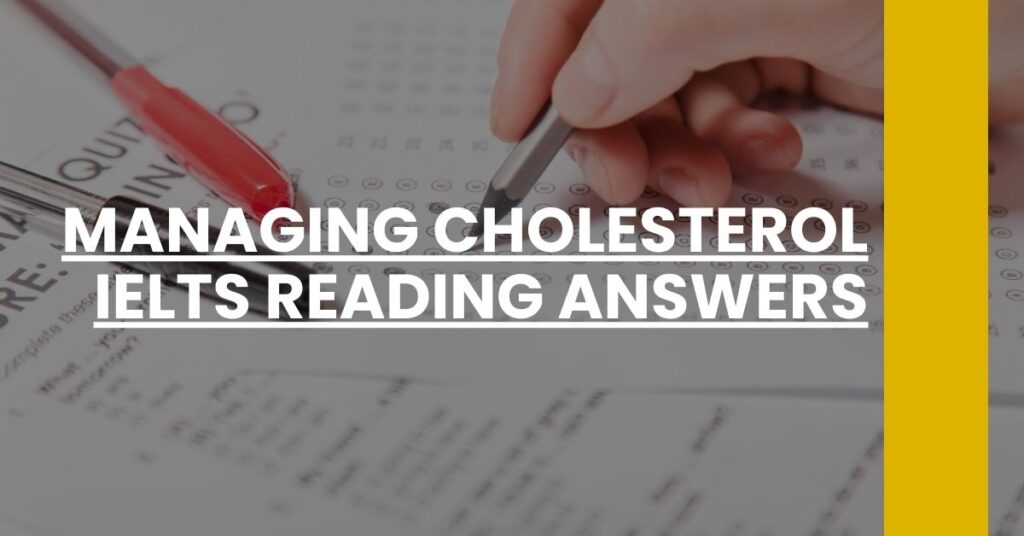Uncover the secrets to managing cholesterol IELTS reading answers with ease.
- IELTS Reading Techniques: Master question types tailored to cholesterol management topics.
- Vocabulary Expansion: Enhance your understanding with key cholesterol-related terms.
- Health and Exam Synergy: Apply IELTS insights to real-world cholesterol control.
Elevate your skills in managing cholesterol IELTS reading answers today.
- Understanding Cholesterol and Its Impact on Health
- IELTS Reading Skills: Decoding Questions on Cholesterol
- Common Themes Around Cholesterol in IELTS Reading Passages
- Interpreting Data and Studies in IELTS Reading on Cholesterol Management
- Vocabulary Building: Cholesterol-Related Terms for IELTS Success
- Improving Paraphrasing Skills for IELTS Reading on Cholesterol Topics
- The Link Between Diet, Cholesterol, and IELTS Reading Passages
- Real-life Applications: Beyond IELTS to Managing Your Cholesterol
- Conclusion: Merging IELTS Prep With Health Literacy on Cholesterol
Understanding Cholesterol and Its Impact on Health
Cholesterol might seem like a villain in your body’s complex narrative, but it’s essential to appreciate that it plays a pivotal role in maintaining your health. To put it simply, cholesterol is a type of fat, needed for building cell membranes, producing hormones, and generating vitamin D. Yet, the storyline takes a twist when cholesterol levels tip the scales too far—particularly the Low-Density Lipoprotein (LDL), notoriously dubbed the ‘bad’ cholesterol.
The Good, The Bad, and The Balance
- HDL: High-Density Lipoprotein or ‘good’ cholesterol helps ferry cholesterol away from your arteries.
- LDL: Low-Density Lipoprotein, if in excess, leads to plaque buildup in arteries which can cause heart troubles.
- Triglycerides: These are a type of fat in your blood that high levels can further risk factors for heart disease.
Keeping cholesterol in check isn’t just about avoiding a specific food group—it’s a multifaceted approach involving diet, exercise, and sometimes medication. Picture your body as an ecosystem where everything is interconnected, and cholesterol management becomes a daily act of balance.
For effective cholesterol management, the American Heart Association suggests a diet rich in fruits, vegetables, whole grains, poultry, fish, and nuts. Additionally, staying physically active and maintaining a healthy weight are cardinal rules to follow.
The Why Behind Cholesterol Management
Why invest energy in managing cholesterol? Because heart health is not an area where you want surprises. Elevated cholesterol levels can silently erect barriers in your bloodstream, leading to heart attacks or strokes—events that change lives in a heartbeat, literally.
Cholesterol management isn’t just about living longer; it’s about adding vibrant, healthy years to your life. You want to be there, in full bloom, for every milestone, every adventure, and every quiet, ordinary day that deserves to be cherished. By keeping cholesterol in line, you’re safeguarding those future moments.
IELTS Reading Skills: Decoding Questions on Cholesterol
When you’re practicing for the IELTS reading section, decoding questions that revolve around managing cholesterol can seem daunting. But don’t fret—there are maneuvers you can employ to navigate through these health-related texts.
Analyze the Question Types
IELTS reading questions are a mixed bag—each designed to test different facets of comprehension. For instance:
- Multiple Choice: Identify key ideas and details to select the correct answer.
- True/False/Not Given: Hone your skills to determine the accuracy of statements based on the passage.
It’s imperative to dissect what each question type is asking of you. For a topic like cholesterol, anticipate questions probing the effects of high cholesterol or perhaps the benefits of dietary changes.
Sharpen Your Focus
As you tackle passages about cholesterol, stay razor-sharp on details. Avoid the pitfall of glossing over complex medical terms; instead, home in on the ways these terms are used in context. Active reading—like annotating or summarizing paragraphs in your mind—can be a valuable ally here.
Timed Practice
Remember, the IELTS is as much a test of your timing as your comprehension. Practicing with a clock can help you gauge when to dwell on a paragraph and when to move on. Even when the subject matter—like cholesterol management—is thick with information, pace yourself to digest and recall effectively.
Common Themes Around Cholesterol in IELTS Reading Passages
The IELTS exam often mirrors real-world concerns, and cholesterol management is a hot topic both in public health and within the exam’s reading material.
Anticipate Themes
- Dietary Impacts: You’ll likely encounter passages discussing diets that can influence cholesterol levels.
- Preventive Measures: Look for readings on lifestyle changes that contribute to healthier cholesterol ranges.
- Medical Interventions: Be prepared for texts explaining how different medications, like statins, tackle cholesterol.
Recognizing these themes is your first step to understanding. But to excel, you’ll need to engage deeply with each paragraph, asking yourself how it contributes to the text’s overall message about managing cholesterol.
Context is King
For example, if the passage delves into diets that affect cholesterol, don’t just register ‘Mediterranean diet’ as a recommended option—absorb the reasons why it’s beneficial. The IELTS is probing your ability to grasp explanations, implications, and viewpoints, all of which are crucial when discussing a nuanced issue like cholesterol management.
Interpreting Data and Studies in IELTS Reading on Cholesterol Management
Data and studies form the backbone of many IELTS reading passages, especially when the subject is as scientifically rich as cholesterol management. Here’s how to turn this section from daunting to doable.
Break Down Data
When you come across a graph or study, don’t rush. Digest the information piece by piece.
- Identify Key Components: What is being measured? Over what period? What are the variables?
- Distinguish Patterns: Are there any trends or notable exceptions?
- Relate Back to Text: How does this data support or challenge the passage’s arguments?
Feeling overwhelmed by terminology? Don’t panic; approach it methodically. First, isolate unfamiliar terms. Then, hunt for clues in the surrounding text to deduce meanings.
Evaluate Studies
Studies presented in reading passages won’t just be there for show—they’re there to substantiate claims about cholesterol’s health impacts or to provide evidence for recommended management strategies.
- Do the Outcomes Match the Hypotheses? Always check if the study’s results align with what the researchers expected.
- Who Conducted the Study? Sometimes, passages might hint at studies’ credibility by detailing their sources.
Remember, your ability to navigate data and studies on cholesterol doesn’t just reflect your adeptness at tackling the IELTS—it also enhances your understanding of how to manage cholesterol effectively, knitting together the practice of exam preparation and the tapestry of real-world knowledge.
Vocabulary Building: Cholesterol-Related Terms for IELTS Success
The language of cholesterol management is peppered with terms that might come across as cryptic jargon. However, expanding your vocabulary in this area is pivotal for both understanding IELTS reading passages and for managing cholesterol in your own life. Let’s demystify these terms and engrain them in your lexicon.
Decoding Medical Terminology
- LDL (Low-Density Lipoprotein): Often tagged as ‘bad cholesterol’, high levels of LDL can lead to plaque buildup in arteries.
- HDL (High-Density Lipoprotein): This ‘good cholesterol’ aids in transporting cholesterol to your liver to be expelled from your body.
- Triglycerides: Another type of fat which, when elevated, may increase the risk of heart disease.
- Statins: Medications that can lower LDL levels and are frequently part of cholesterol management plans.
- Atherosclerosis: A condition characterized by hardened arteries due to plaque accumulation, often linked with high cholesterol.
Everyday Language for Complex Concepts
Many IELTS passages will refer to cholesterol with phrases that may sound complex but can be simplified. For instance:
- ‘Cholesterol-lowering foods’ could be a less intimidating way of referencing dietary choices beneficial for managing LDL levels.
- ‘Cardiovascular risk factors’ are elements in your life, like high cholesterol, that can negatively impact heart health.
Language is a powerful tool and using the right terminology will enhance your interpretation of IELTS reading passages specifying cholesterol-lowering interventions.
Improving Paraphrasing Skills for IELTS Reading on Cholesterol Topics
IELTS readers encounter a vast amount of information. It’s essential to digest this information and then express it in your own words. Paraphrasing is a critical skill for successful comprehension, and it’s especially valuable when discussing complex topics like cholesterol management.
Strategies for Effective Paraphrasing
- Read Actively: Truly engage with the text, annotating as you go to underline key ideas you’ll need to paraphrase.
- Change the Word Order: Start your sentence at a different point, changing the structure but retaining the original meaning.
- Use Synonyms: Find alternative words that convey the same context—’elevate’ can substitute for ‘raise’, ‘diminish’ for ‘lower’.
A well-paraphrased sentence retains the essence of the original message without copying the wording. For example, if an IELTS passage states that “high cholesterol is intricately linked with heart disease,” you might say “a significant correlation exists between elevated cholesterol levels and cardiac health concerns.”
Paraphrasing not only reflects your understanding but also your ability to navigate health-related topics such as cholesterol efficiently. It’s about cultivating resourcefulness with language, which is indispensable when tackling managing cholesterol IELTS reading answers.
The Link Between Diet, Cholesterol, and IELTS Reading Passages
Diet and cholesterol are entwined in a delicate dance of cause and effect, and understanding this interplay is not just vital for health but also for the IELTS reading section. When you encounter passages on this topic, it’s imperative to recognize the integral link between the nutrients we consume and our cholesterol levels.
Identifying Dietary Connections
- Saturated Fats: Typically found in animal products; known to increase LDL cholesterol.
- Plant Sterols and Stanols: Often added to products like margarine; help lower cholesterol absorption.
- Fiber-rich Foods: Such as whole grains and legumes; contribute to lowering bad cholesterol.
When you encounter a passage citing dietary advice for cholesterol management, these concepts won’t seem foreign. Instead, they’ll be old friends, helping you master the craft of managing cholesterol IELTS reading answers and your dietary choices.
Real-life Applications: Beyond IELTS to Managing Your Cholesterol
Your journey with cholesterol literacy doesn’t stop at the IELTS reading section; it extends into how you manage your own health. Every strategy, every term, and every understanding you develop can ripple into your daily life, leading to better health outcomes.
Just think: the detailed passage about the Mediterranean diet you dissect for IELTS prep is not just a reading exercise. It’s a practical guide—a roadmap to tweaking your diet for improved heart health. The comprehension skills honed while practicing for IELTS reading allow you to dissect complex medical advice and understand cholesterol management strategies that can benefit you personally.
Achieving mastery in managing cholesterol IELTS reading answers can have a cascade effect, empowering you to take charge of your health by making informed decisions. It’s here, at the intersection of exam prep and life skills, where the true value of your study regimen shines through.
Conclusion: Merging IELTS Prep With Health Literacy on Cholesterol
In conclusion, managing cholesterol IELTS reading answers is more than just about passing a section of an exam—it’s about educating yourself on a critical aspect of your well-being. As you delve deeper into readings on cholesterol, remember that each paragraph you interpret, each term you memorize, and each strategy you implement enriches your understanding. This preparation doesn’t just lead to IELTS success; it fosters a well-rounded knowledge that contributes to a healthier, more informed you.
Managing cholesterol IELTS reading answers: Uncover essential strategies and health tips for top scores and better well-being.

